 W
WThis is a list of works addressing the subject or the themes of intelligent design.
 W
WBiology for Christian Schools is a 1991 school-level biology textbook written from a Young Earth Creation point of view by William S. Pinkston and published by the Bob Jones University Press. The book has been controversial because it espouses the idea of Biblical inerrancy; that whenever science and Christianity conflict, the current scientific understanding is wrong. The book promotes creationism, which is rejected by the National Academy of Sciences, the National Association of Biology Teachers and the National Science Teachers Association who state creationism and intelligent design are pseudoscience.
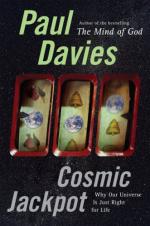 W
WCosmic Jackpot, also published under the title The Goldilocks Enigma: Why is the Universe Just Right for Life?, is a 2007 non-fiction book by physicist and cosmologist Paul Davies, describing the idea of a fine-tuned universe.
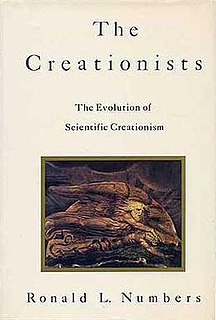 W
WThe Creationists: From Scientific Creationism to Intelligent Design is a history of the origins of anti-evolutionism by Ronald Numbers. First published in 1992 as The Creationists: The Evolution of Scientific Creationism, a revised and expanded edition was published under the current title in 2006.
 W
WDarwin on Trial is a 1991 book by law professor Phillip E. Johnson disputing tenets of science and evolution and promoting creationism. Johnson wrote the book with the thesis that evolution could be "tried" like a defendant in court. Darwin on Trial became a central text of the intelligent design movement, and Johnson has been described as the "father of ID".
 W
WDarwin's Black Box: The Biochemical Challenge to Evolution is a book by Michael J. Behe, a professor of biochemistry at Lehigh University in Pennsylvania and a senior fellow of the Discovery Institute's Center for Science and Culture. In the book Behe presents his notion of irreducible complexity and argues that its presence in many biochemical systems therefore indicates that they must be the result of intelligent design rather than evolutionary processes. In 1993, Behe had written a chapter on blood clotting in Of Pandas and People, presenting essentially the same arguments but without the name "irreducible complexity," which he later presented in very similar terms in a chapter in Darwin's Black Box. Behe later agreed that he had written both and agreed to the similarities when he defended intelligent design at the Kitzmiller v. Dover Area School District trial.
 W
WDarwinism, Design and Public Education is a 2003 anthology, consisting largely of rewritten versions of essays from a 1998 issue of Michigan State University Press's journal, Rhetoric and Public Affairs, edited by intelligent design activists John Angus Campbell and Stephen C. Meyer, neither of whom are scientists. The book is promoted as being a "peer-reviewed science book", however in reviewing it Barbara Forrest notes that:Nineteen of the twenty-seven essays are by ID creationists and their supporters, not one of whom is a working evolutionary biologist. Among the eight pro-evolution essays, only four are by scientists. Of those, only two are by evolutionary biologists. There is a preponderance of humanities scholars; some, like rhetorician John Angus Campbell, are ID proponents while others are pro-evolution.
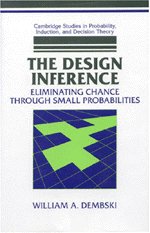 W
WThe Design Inference: Eliminating Chance through Small Probabilities is a 1998 book by American philosopher and mathematician William A. Dembski, a proponent of intelligent design, which sets out to establish approaches by which evidence of intelligent agency could be inferred in natural and social situations. In the book he distinguishes between 3 general modes of competing explanations in order of priority: regularity, chance, and design. The processes in which regularity, chance, and design are ruled out one by one until one remains as a reasonable and sufficient explanation for an event, are what he calls an "explanatory filter". It is a method that tries to eliminate competing explanations in a systematic fashion including when a highly improbable event conforms to a discernible pattern that is given independently of the event itself. This pattern is Dembski's concept of specified complexity. Throughout the book he uses diverse examples such as detectability of spontaneous generation and occurrence of natural phenomena and cases of deceit like ballot rigging, plagiarism, falsification of data, etc.
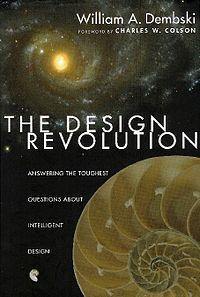 W
WThe Design Revolution: Answering the Toughest Questions about Intelligent Design is a 2004 book by William A. Dembski, who supports intelligent design, and the idea that certain features of the universe and of living things are best explained by an intelligent cause, not a naturalistic process such as natural selection. The book is written in question/answer format from Dembski's point of view as one of the conceptual leaders in the movement. Each chapter is about 4 pages long and addresses one specific question. Dembski describes these questions as from his prior ten years experience in lectures, media interviews, and published criticism by the scientific community opposed to intelligent design, who constitute the majority of the scientific community and science education organizations. The foreword was written by Charles W. Colson.
 W
WThe Devil in Dover: An Insider's Story of Dogma v. Darwin in Small-Town America is a 2008 book by journalist Lauri Lebo about the Kitzmiller v. Dover Area School District intelligent design trial, through her own perspective as a local reporter on the trial as she confronted her own attitudes about organized religion and her father who was a fundamentalist Christian.
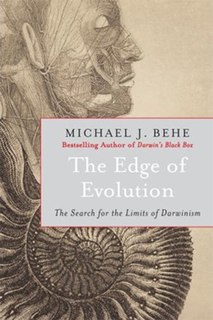 W
WThe Edge of Evolution: The Search for the Limits of Darwinism is an intelligent design book by Discovery Institute fellow Michael Behe, published by the Free Press in 2007. Behe argues that while evolution can produce changes within species, there is a limit to the ability of evolution to generate diversity, and this limit is somewhere between species and orders. On this basis, he says that known evolutionary mechanisms cannot be responsible for all the observed diversification from the last universal ancestor and the intervention of an intelligent designer can adequately account for much of the diversity of life. It is Behe's second intelligent design book, his first being Darwin's Black Box.
 W
WEvolution: A Theory in Crisis is a 1985 book by Michael Denton, in which the author argues that the scientific theory of evolution by natural selection is a "theory in crisis". Reviews by scientists say that the book distorts and misrepresents evolutionary theory and contains numerous errors.
 W
WExplore Evolution: The Arguments For and Against Neo-Darwinism is a controversial biology textbook written by a group of intelligent design supporters and published in 2007. Its promoters describe it as aimed at helping educators and students to discuss "the controversial aspects of evolutionary theory that are discussed openly in scientific books and journals but which are not widely reported in textbooks." As one of the Discovery Institute intelligent design campaigns to "teach the controversy" its evident purpose is to provide a "lawsuit-proof" way of attacking evolution and promoting pseudoscientific creationism without being explicit.
 W
WFrom Darwin to Hitler: evolutionary ethics, eugenics, and racism in Germany is a 2004 book by Richard Weikart, a historian at California State University, Stanislaus, and a senior fellow for the Center for Science and Culture of the creationist Discovery Institute. The work is controversial. Graeme Gooday, John M. Lynch, Kenneth G. Wilson, and Constance K. Barsky wrote that "numerous reviews have accused Weikart of selectively viewing his rich primary material, ignoring political, social, psychological, and economic factors" that helped shape Nazi eugenics and racism.
 W
WGodless: The Church of Liberalism is a book by best-selling author and American far-right columnist Ann Coulter, published in 2006. The book is an argument against American liberalism, which Coulter regards as so anti-scientific and faith-based that it amounts to a "primitive religion" which she claims has "its own cosmology, its own explanation for why we are here, its own gods, and its own clergy." Coulter asserts that "the basic tenet of liberalism is that nature is god and men are monkeys."
 W
WIcons of Evolution is a book by Jonathan Wells, an intelligent design advocate and fellow of the Discovery Institute, in which Wells criticizes the paradigm of evolution by attacking how it is taught. The book includes a 2002 video companion. In 2000, Wells summarized the book's contents in an article in the American Spectator. Several of the scientists whose work is sourced in the book have written rebuttals to Wells, stating that they were quoted out of context, that their work has been misrepresented, or that it does not imply Wells' conclusions.
 W
WIntelligent Design: The Bridge Between Science and Theology is a 1999 book by the mathematician William A. Dembski, in which the author presents an argument in support of intelligent design. Dembski defines the term "specified complexity", and argues that instances of it in nature cannot be explained by Darwinian evolution, but instead are consistent with the intelligent design. He also derives an instance of his self-declared law of conservation of information and uses it to argue against Darwinian evolution. The book is a summary treatment of the mathematical theory he presents in The Design Inference (1998), and is intended to be largely understandable by a nontechnical audience. Dembski also provides a Christian theological commentary, and analysis of, what he perceives to be the historical and cultural significance of the ideas.
 W
WIntelligent Thought: Science Versus the Intelligent Design Movement is a 2006 book edited by John Brockman and published by Vintage Books. The book is a series of essays which discuss the idea that natural selection and evolution helps explain the world better than intelligent design. The contributors are Daniel Dennett, Scott Atran, Steven Pinker, Nicholas Humphrey, Tim White, Neil Shubin, Marc Hauser, Richard Dawkins, Jerry Coyne, Leonard Susskind, Frank Sulloway, Lee Smolin, Stuart A. Kauffman, Seth Lloyd, Lisa Randall, and Scott Sampson.
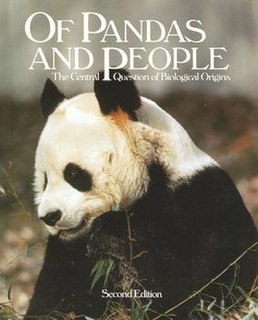 W
WOf Pandas and People: The Central Question of Biological Origins is a controversial 1989 school-level textbook written by Percival Davis and Dean H. Kenyon, edited by Charles Thaxton and published by the Texas-based Foundation for Thought and Ethics (FTE). The textbook endorses the pseudoscientific concept of intelligent design – the argument that life shows evidence of being designed by an intelligent agent which is not named specifically in the book, although proponents understand that it refers to the Christian God. The overview chapter was written by young Earth creationist Nancy Pearcey. They present various polemical arguments against the scientific theory of evolution. Before publication, early drafts used cognates of "creationist". After the Edwards v. Aguillard Supreme Court ruling that creationism is religion and not science, these were changed to refer to "intelligent design". The second edition published in 1993 included a contribution written by Michael Behe.
 W
WOnly A Theory: Evolution and the Battle for America's Soul is a 2008 book by the American cell biologist and Roman Catholic Kenneth R. Miller. In the book, Miller examines the battle between evolution and intelligent design (ID), and explores the implications of the battle for science in America. The title of the book comes from a misconception of what "theory" means in the context of science and evolution.
 W
WThe Privileged Planet: How Our Place in the Cosmos is Designed for Discovery is a 2004 book by Guillermo Gonzalez and Jay Richards, in which the authors claim scientific evidence for intelligent design. Both Gonzalez and Richards are associated with the Discovery Institute, identified with the intelligent design movement; Gonzalez works as a senior fellow of the Discovery Institute's Center for Science and Culture.
 W
WSignature in the Cell: DNA and the Evidence for Intelligent Design is a 2009 book about intelligent design by philosopher and intelligent design advocate Stephen C. Meyer. The book was well received by some within the conservative, intelligent design and evangelical communities, but several other reviewers were critical and wrote that Meyer's claims are incorrect.
 W
WUncommon Dissent: Intellectuals Who Find Darwinism Unconvincing is a 2004 anthology edited by William A. Dembski in which fifteen intellectuals, eight of whom are leading intelligent design proponents associated with the Discovery Institute's Center for Science and Culture (CSC) and the International Society for Complexity, Information and Design (ISCID), criticise "Darwinism" and make a case for intelligent design. It is published by the publishing wing of the paleoconservative Intercollegiate Studies Institute. The foreword is by John Wilson, editor of the evangelical Christian magazine Christianity Today. The title is a pun on the principle of biology known as common descent. The Discovery Institute is the engine behind the intelligent design movement.